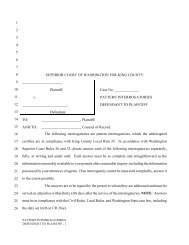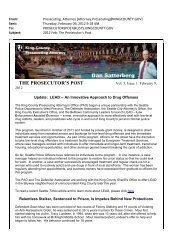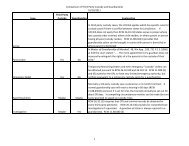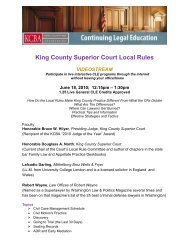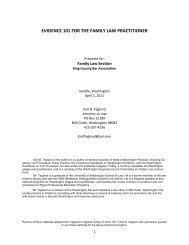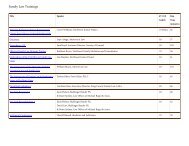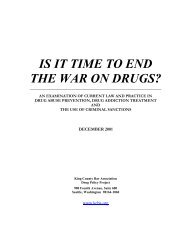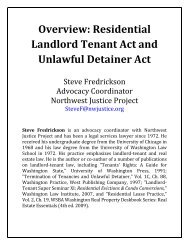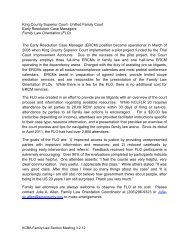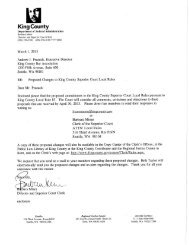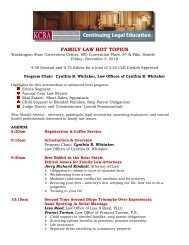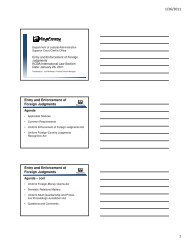Effective Drug Control: Toward A New Legal Framework
Effective Drug Control: Toward A New Legal Framework
Effective Drug Control: Toward A New Legal Framework
You also want an ePaper? Increase the reach of your titles
YUMPU automatically turns print PDFs into web optimized ePapers that Google loves.
Growing Federal Commerce Power – Pending Supreme Court Decisions<br />
Decisions in two separate matters argued before the U.S. Supreme Court in the<br />
2004-05 term will further define the scope of federal commerce power in the area of drug<br />
control. In Ashcroft v. Raich 536 , individuals permitted under California law to use<br />
marijuana for medical purposes either grow their own or are given free supplies, an<br />
arrangement that arguably constitutes entirely non-commercial, intrastate activity beyond<br />
the reach of Congress. Whether the Court agrees with this argument remains to be seen;<br />
a Court ruling against the California respondents in this case would enlarge federal<br />
commerce power to an historic level. 537<br />
The other relevant matter pending before the Court involves out-of-state wineries<br />
and their interest in boosting internet sales by being allowed to ship directly into states<br />
that have more restrictive alcohol control laws. 538 These consolidated cases pit federal<br />
commerce power against the 21 st Amendment, with winemakers arguing that the<br />
Commerce Clause, which prohibits states from limiting interstate commerce, takes<br />
precedence over the 21st Amendment, which gives states the right to regulate alcohol.<br />
Numerous conflicting decisions on this issue in the lower courts across the country<br />
necessitated U.S. Supreme Court action. 539 A decision in the winemakers’ favor would<br />
further erode the states’ purportedly exclusive control over alcohol regulation. 540<br />
THE COMMERCE CLAUSE TURNED ON ITS HEAD<br />
In the early days of American legal history, the Commerce Clause was interpreted<br />
to embody a national policy of free trade, implying that states may not discriminate<br />
against one another and that Congress may act to reduce discriminatory barriers to<br />
commerce between the states. After a century of expanded interpretation, however, the<br />
Commerce Clause has not so much served to reduce barriers to free trade between the<br />
states as it has served to permit federal intervention in matters that once were the sole<br />
province of the states.<br />
In the drug policy arena, broad federal commerce power has arguably stifled<br />
innovation on the state level and limited the states’ discretion to exercise their inherent<br />
police powers. Although states currently comply willingly with the framework of federal<br />
preemption over drug policy, dissent is growing, not only regarding the continued federal<br />
prohibition of the use of marijuana for medical purposes, but also in reaction to federal<br />
intervention in the medical profession regarding the treatment of chronic pain. 541<br />
However, if Washington or any other state were to depart fundamentally from the federal<br />
model of drug prohibition and attempt to establish an alternative regulatory system to<br />
control psychoactive substances, such efforts might run headlong into a century of case<br />
law supporting federal preemption.<br />
Tests for State Police Power – A <strong>Drug</strong> Policy Scenario<br />
To test a hypothetical scenario in which the state of Washington were to establish<br />
its own regulatory framework for drug control as an alternative to prohibition, certain key<br />
principles from landmark cases interpreting the reach of federal commerce power may<br />
help to guide whether such state action would be permissible:



